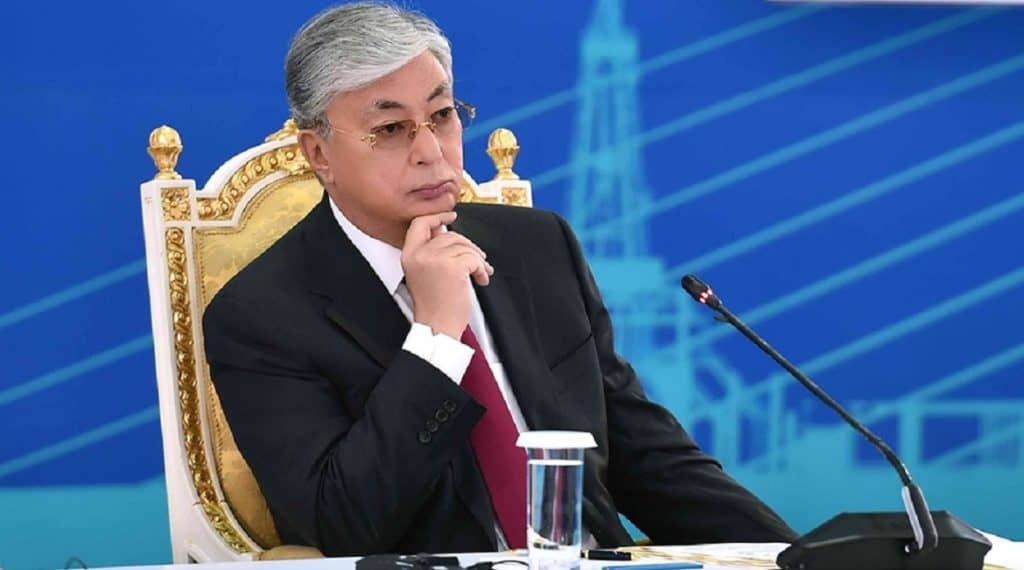By Nikola Mikovic
Sandwiched between two giant neighbors – Russia and China – Kazakhstan aims to strengthen its positions in Central Asia, and also to develop close ties with other major global actors, namely with the European Union and the United States.

Under the current geopolitical circumstances, Astana’s “multivector foreign policy”, initially established by the former country’s president Nursultan Nazarbayev, does not seem to have an alternative.
The largest country in Central Asia seeks to diversify its economy, and at the same time to establish its own independent position in the world. But the problem for Astana is that it could eventually be under pressure to pick a side in a new Cold War. For now, Kazakhstan is attempting to benefit from tense relations between the West and Russia by becoming a prominent transcontinental transportation hub.
“This ambition is embodied in the Middle Corridor that links China and the EU via rail, sea, and road”, said Roman Vassilenko, Deputy Foreign Minister of Kazakhstan, at a media briefing on the Astana International Forum, taking place in the Kazakh capital on June 8-9.
Indeed, the Middle Corridor, also known as the Trans-Caspian International Transportation Route (TITR) – starting from Southeast Asia and China, running through Kazakhstan, the Caspian Sea, Azerbaijan, and Georgia – is seen as an alternative to reach European and international markets and bypass Russia. Astana, despite being Russia’s nominal ally in the Collective Security Treaty Organization (CSTO), as well as a member of the Russian-dominated Eurasian Economic Union (EAEU), could play a very important role in this process.
According to Alibek Kuantyrov, Kazakhstan’s Minister of National Economy, the Middle Corridor could eventually become part of China’s Belt and Road Initiative. As a result, Beijing may stop being ambivalent regarding this infrastructure project. But will such a Kazakh policy of participation in projects aimed at bypassing Russia have an impact on the country’s relations with Moscow?
Even if it wants to, the Kremlin is not in a position to seriously pressure Astana not to get involved in the construction of the Middle Corridor. Moscow, isolated from the West, seeks to preserve remnants of its influence in Kazakhstan. That is why it is unlikely willing to risk jeopardizing its relations with the Central Asian nation regardless of Astana’s cooperation with the West, as well as with other global and regional actors. At this point, Russia seems to be satisfied with the fact that Kazakhstan has not joined Western sanctions against Moscow.
“We do not support anti-Russian sanctions, but we comply”, said Kazakhstan’s Minister of National Economy on June 7, pointing out that the country’s economic interests are Astana’s top priority.
In other words, Kazakhstan will not allow Russia to circumvent sanctions, since such actions could result in secondary EU sanctions against Kazakh companies. The Kremlin, for its part, can unlikely force Astana to change its current foreign policy course. Bogged down in Ukraine, Russia does not seem to have capacity to pressure Kazakhstan to take an active pro-Russian stance. Therefore, Moscow will have to accept a new reality in which Astana will remain part of the EAEU, but will not go beyond economic integration into this entity.
The very fact that Kazakhstan recently introduced an electronic monitoring system for goods exported to the EAEU members indicates that the Central Asian nation aims to prevent Russia from using Kazakhstan’s territory to evade Western sanctions through a free trade within the Eurasian Union. On the other hand, the European Union is expected to continue increasing its presence not only in Kazakhstan – a country whose major trade partner is the EU – but in Central Asia in general. Since the beginning of the war in Ukraine, the EU held various summits with Central Asian nations, which suggests that Brussels might attempt to gradually crowd Moscow out of the region that has traditionally been in the Russian sphere of influence.
The fact that the Kazakh economy is almost one third bigger than the economies of other Central Asian countries combined, and that around 60 percent of foreign investment in the region falls on Kazakhstan, means that the EU will continue to pay special attention to its relations with Astana. For both, Kazakhstan and the European Union, energy cooperation plays a crucial role in their partnership.
Given that 80 percent of the Kazakh oil exports to the West go through Russian pipelines, for the foreseeable future Astana is expected to continue carefully balancing its ties with Moscow, and its ambitions to become one of major European oil suppliers. But in the long-term, if alternative energy routes that bypass Russia become fully operational, Kazakhstan is expected to significantly reduce its dependence on the Kremlin, which means that for Astana, preserving a nominal alliance with the Russian Federation may no longer be as important as it is now.
In the meantime, the energy-rich Central Asian nation will undoubtedly continue pursuing its “multi-vector” foreign policy. And neither Moscow nor the West seem to oppose such an approach.
Author: Nikola Mikovic (Journalist, researcher and analyst based in Serbia. He covers mostly the foreign policies of Russia, Belarus and Ukraine)
(The views expressed in this article belong only to the author and do not necessarily reflect the views of World Geostrategic Insights).







